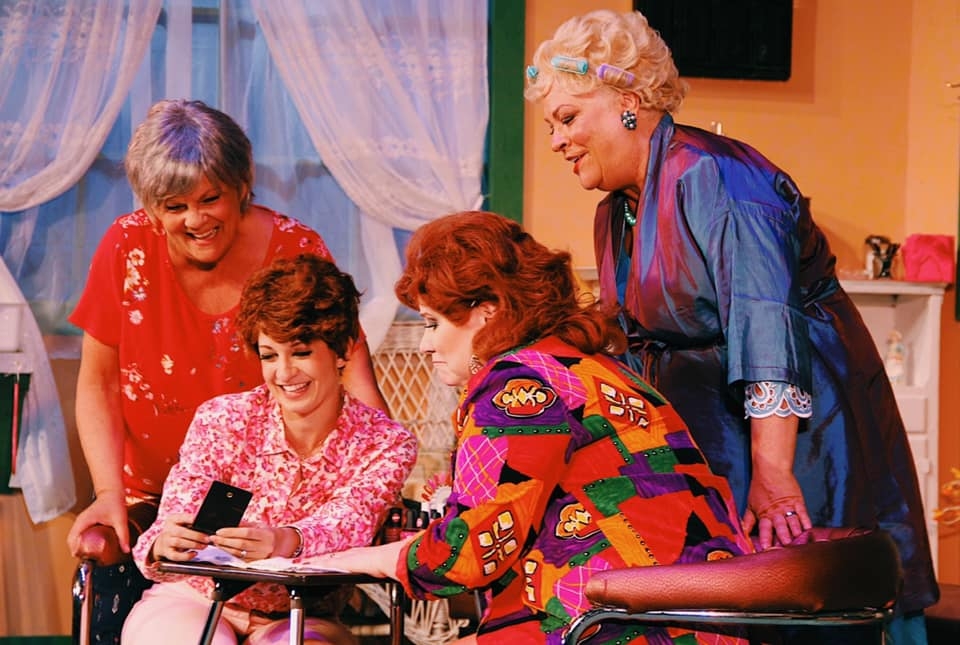“Strong woman” is more often than not a redundant phrase, but nowhere more so than in the South. And even amid the grand canon of 20th Century Southern literature, very few works honor and capture the realness, sharp wit, and fierce love of the strong Southern woman better than Robert Harling’s “Steel Magnolias.”
And it’s hard to imagine these characters and brilliant story brought to life more vividly than they are in the current production at The Barn Theatre. Directed with extraordinary heart and attention to detail by Hans Friedrichs with an all-star cast, it will undoubtedly make you laugh and ugly cry as you peek into this powerful world made real.
Beloved for more than 30 years as both a play and a film, “Steel Magnolias” became practically an instant iconic classic. Set in small town Louisiana in the 1980s, it places six women at different stages of life, including a fiercely protective mother and sickly yet stubborn daughter, in their natural habit: a beauty parlor. Separate from men, they speak and behave freely, sharing heartbreak and hilarity, gossip and unwanted advice. From births to marriage to deaths; health problems, gay relatives, religion, abusive relationships, divorce, and post-retirement dating — there is little these characters shy away from discussing and often making fun of.
It’s a terrific script, based on a true story and written in 10 days, building in character, emotion, and time elegantly to a crescendo so emotional it can catch you off guard no matter how many times you’ve seen it; and this powerhouse of an ensemble cast makes it next level with their individual and collective performances that make you forget they're acting.
It’s so easy to get caught up in their banter and bickering because their relationships are so familiar and clearly built on love for one another. Their ease and naturalness with one another is palpable both in terms of their physicality in their own bodies and with each other.
Any woman who grew up in the South knows “There is no such thing as natural beauty,” but when Jennifer Furney says so as self-deprecating Truvy Jones, the beautician extraordinaire who is the glue that bands these women together, it’s funnier than you can imagine. Lori Moore capitalizes on her local celebrity and wonderfully expressive face as Claire, and Samantha Rickard is a nervous little spaz as battered wife and newcomer Annelle who evolves masterfully as the play goes on.
Barn favorite Kim Zimmer’s entrance alone brings down the house with applause, and then she earns every clap and more with her marvelous performance as Ouiser, the town curmudgeon who’s “not crazy,” she’s “just been in a bad mood for 40 years.” She raises the energy of every scene she’s in, even when her role is to be grumpy, though she never pulls focus from exactly where it needs to be. She completely embodies the paradox of this complex character in the most delightful of ways.
Penelope Alex and Melissa Cotton Hunter create a powerful mother-daughter bond as M’Lynn and Shelby, and their story and relationship is the lynchpin of the story. Hunter’s sweet innocence and willfulness make Shelby infinitely sympathetic, and Alex exudes righteous mama bear realness as well as earned martyrdom and grief are simply stunning. The play’s pinnacle moment is hers, and it takes your breath away — then within seconds makes you belly laugh. “Laughter through tears — that’s my favorite emotion,” Furney says as Truvy, and seeing this show absolutely inspires this powerful emotion.
From curtain up, 1980s southern culture comes alive not just through the brilliant dialogue, but also through the show’s design. Steven Lee Burright’s set makes Truvy’s in-home beauty parlor cozy and wonderfully functional and fully brings the audience into the 1980s with little touches such as images of Tom Selleck and Farrah Fawcett on the mirrors and pictures that remind us of the Southern truism “the higher the hair the closer to God” without the characters having to say it. Sam Rudy’s props and Michael Wilson Morgan’s costumes also capitalize on the period as well as the passage of time in the four scenes within the play.
Shelby defiantly proclaims she’d “rather have 30 minutes of wonderful than a lifetime of nothing special” in the play’s first act, though audiences of the Barn’s “Steel Magnolias” don’t have to make the choice. In this most excellent production, audiences easily receive the gift of nearly two hours of wonderful.
Steel Magnolias
Barn Theatre
July 30-Aug. 11
barntheatreschool.org





